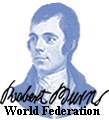|
Conclusion
At the end of this examination we are now in the position to summarize
and to evaluate crucial aspects of this analysis. First I would like to
remind the reader of the fact that the Scots in Burns` and Scott`s day
were looking for a new identity for the old had- due the political and
cultural clash which was a result of 'the Union- disappeared. We may assert
here that Scottish self-esteem and pride were destroyed in the wake of
this depressing situation. Many Scotsmen may have lost their traditions
because everything was to be changed into an English model. This loss
of identity could not be compensated by wealth, for many Scotsmen- like
Burns himself- believed in the Scottish nation. As a consequence, there
were rebellions against this new order. Burns and also Scott sympathized
and Burns even identified with the 'Jacobite cause'. However, not all
Scots supported the 'Jacobite Rebellion' and in the end the rising was
overcome. 'Old Scotland' was fading gradually but inevitably. Burns, however,
never escaped the 'old Scotland'. In order to fill the 'identity gap'
literature stepped in. In this examination we have seen the Scottish literary
revival on behalf of both Burns and Scott. The Scottish vernacular tradition
was revived, but Scots was also mixed with English. Both writers created
a new and old Scottish tradition. With this (re)-invention they contributed
to a certain type of Scottish national identity, and, additionally, both
created a legend. Indeed there are similarities as far as Burns and Scott
are concerned, but on the whole we may find a different perception and
interpretation of the Scottish past and future. It could be described
as a divergent image of 'Scottishness'. Burns` definition of 'Scottishness'
may have be seen in the description of social inequality and injustice
represented by demands concerning education and schooling, social rights
and the overcoming of 'class distinction'. He contributed to the development
of 'social movements' which were fighting for social rights, reforms and
independence. In his poetry he supported 'the poor', the 'working class'
and the 'common man'. Burns himself may have stood for the 'have-nots',
whereas Scott was a representative of the 'privileged class' or the 'haves'.
Moreover, Scott may have 'wavered' between the old feudal 'Scottish system'
and the new evolving modern 'British system', but in the end he was in
favour of the healing of old divisions. Opposed to Burns who was extremely
left and revolutionary Scott was conservative and peaceful. Furthermore,
he invented the 'Historical Novel' and by doing so he marked the idea
of 'Britishness' because his character Waverley helped consolidate the
British state. Of course, Britain seems to have been a risky construction
then- not only in his novels- and we could still not judge in conclusion
if it really existed, but there may have been a kind of British nationality.
In this sense the political union was fulfilled, but the cultural was
not. Nevertheless, Britain was enriched by Scottish cultural aspects like
'Highlandism'. All in all, we could postulate a 'Scottish-English marriage'.
With the fading of the 'Scottish nation' the 'British nation' was born.
Finally, I would like to remind the reader of the formula 'Englishness'
plus 'Scottishness' equals 'Britishness', and it seems that the last Scot
Burns and the first Brit Scott had two versions of Scottish national identity.
References
and Footnotes
|





